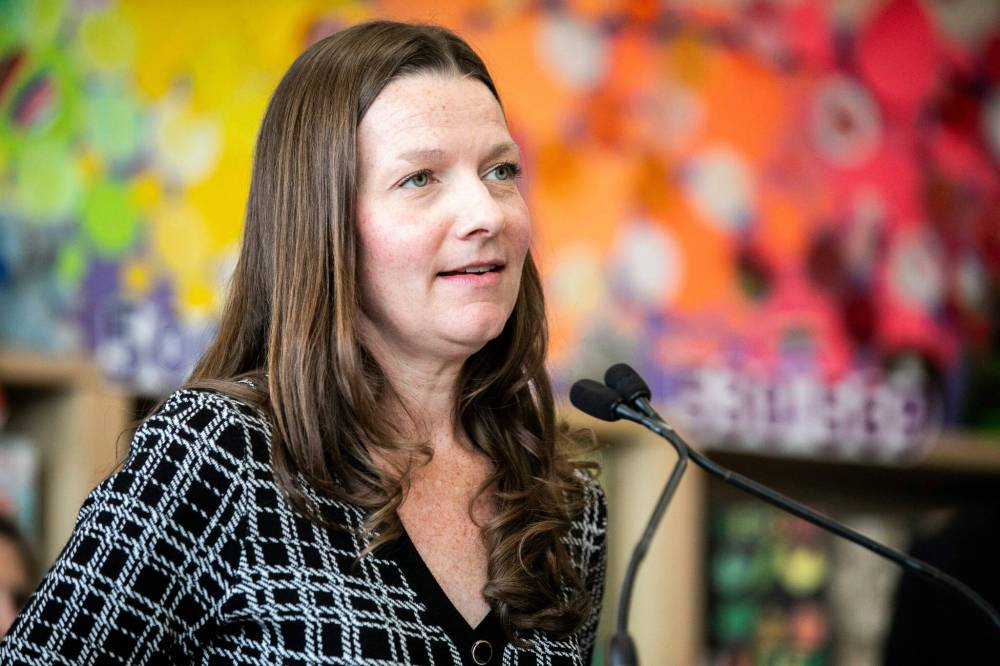Province tries to ease path to teaching
Advertisement
Read this article for free:
or
Already have an account? Log in here »
To continue reading, please subscribe:
Monthly Digital Subscription
$1 per week for 24 weeks*
- Enjoy unlimited reading on winnipegfreepress.com
- Read the E-Edition, our digital replica newspaper
- Access News Break, our award-winning app
- Play interactive puzzles
*Billed as $4.00 plus GST every four weeks. After 24 weeks, price increases to the regular rate of $19.95 plus GST every four weeks. Offer available to new and qualified returning subscribers only. Cancel any time.
Monthly Digital Subscription
$4.99/week*
- Enjoy unlimited reading on winnipegfreepress.com
- Read the E-Edition, our digital replica newspaper
- Access News Break, our award-winning app
- Play interactive puzzles
*Billed as $19.95 plus GST every four weeks. Cancel any time.
To continue reading, please subscribe:
Add Free Press access to your Brandon Sun subscription for only an additional
$1 for the first 4 weeks*
*Your next subscription payment will increase by $1.00 and you will be charged $16.99 plus GST for four weeks. After four weeks, your payment will increase to $23.99 plus GST every four weeks.
Read unlimited articles for free today:
or
Already have an account? Log in here »
Hey there, time traveller!
This article was published 04/11/2024 (447 days ago), so information in it may no longer be current.
Manitoba is cutting red tape in the teacher-certification process as schools struggle to cover staff absences and fill job openings.
Following months of consultation with post-secondary, school division and union leaders, the Education Department announced a series of regulatory changes at the end of October.
Among them, the province is no longer requiring teachers to specialize in an approved list of major or minor subject areas to get certified.

“We think these changes are going to really be able to help us and help divisions staff up their schools. We think it’s going to increase diversity, reduce barriers and, ultimately, help support students,” Tracy Schmidt, acting minister of education, told the Free Press.
Schmidt said the updated regulations will streamline the certification of internationally educated professionals and entry into education faculties.
They align Manitoba with other Canadian jurisdictions, she noted.
Teachers previously had to complete a minimum number of credits in “teachables.”
They could choose a major from 20 core subject areas, including art, mathematics, native studies, phys-ed and French. A different minor, chosen from a longer list with options such as law and psychology, was also required.
“Manitoba had the most stringent requirements for teacher certification in the teachables area, both in the major and minor (demands),” said Nathan Martindale, president of the Manitoba Teachers’ Society.
The senior years stream was made up of 30 credit hours in a major and 18 credit hours in a minor. Those figures were 18 and 12 at the elementary level.
Early and middle-years teachers also required six credit hours each in the following subjects: math, science, one of Canada’s official languages and history and geography, combined.
Martindale noted his teacher training, not unlike many others who have made career pivots, took longer because of the old process.
The union president, who studied political science at the University of Winnipeg, initially entered the public school system as an educational assistant. When he decided to become a teacher, he had to pick an eligible major teachable — he chose history — and complete additional credits to apply to a local faculty of education.
The overhaul puts Manitoba on a more even playing field with the rest of Canada, Martindale said, adding his hope is more people will choose to both train and work in the province.
The University of Manitoba has historically rejected about 30 per cent of applicants to its after-degree education program because they lack prerequisites.

Jan Stewart, dean of education, said many promising candidates left the province in response.
The leader of Manitoba’s largest faculty of education said she’s excited U of M will be able to adjust admissions requirements so they are more straightforward.
“Now, once you have a degree, you can come into education,” Stewart said, noting there is little research to suggest someone with an extensive background in a teachable is more effective in the classroom, as a result.
“We’re hoping that once they come to us, we’ll be able to focus on pedagogy and the teaching of those subjects, and to have a little more flexibility in the way that we design our program.”
The dean added she’s optimistic the updates will reduce barriers for internationally trained teachers and French-language speakers who want to enter the profession.
Per the new regulations, the Russell-based certification branch will accept child-abuse registry and criminal record checks that are dated within six months of a submission, up from three.
The changes also make obtaining training on sexual-abuse prevention a requirement prior to certification.
maggie.macintosh@freepress.mb.ca

Maggie Macintosh
Education reporter
Maggie Macintosh reports on education for the Free Press. Originally from Hamilton, Ont., she first reported for the Free Press in 2017. Read more about Maggie.
Funding for the Free Press education reporter comes from the Government of Canada through the Local Journalism Initiative.
Every piece of reporting Maggie produces is reviewed by an editing team before it is posted online or published in print — part of the Free Press‘s tradition, since 1872, of producing reliable independent journalism. Read more about Free Press’s history and mandate, and learn how our newsroom operates.
Our newsroom depends on a growing audience of readers to power our journalism. If you are not a paid reader, please consider becoming a subscriber.
Our newsroom depends on its audience of readers to power our journalism. Thank you for your support.






